Diploma vs Degree:- Once you complete your school, consider your next step for your higher education, there might be a question at the back of your mind,
‘Whether to pursue a diploma or degree?’
It is one of those classic student difficulties that fails to have an easy answer. Some believe that a degree is the key to a successful professional career, while others may believe that educational qualifications offer immediate, skill-focused results.
What, therefore, is the truth? Which one of the two, degree or diploma, fits your ambitions, learning styles, and professional goals? Understanding your career path, whether you want to be an engineer, designer, data analyst, or entrepreneur, is the first step toward achieving your goals.
The following article will help you understand the difference between Diplomas and Degrees, as well as the benefits of each, to help you determine which path will lead to the best future opportunities.
Also, check, BBA vs. B.Com:- Which Degree is Right for Your Career?
What is a Diploma and a Degree?
Before comparing the two terms, you must know the definition of a Degree and a Diploma. Both a degree and a diploma are academic and professional qualifications that set students up for career success.
What is a Diploma?
A diploma is a certificate, often a short-term (1-3 year) program that emphasises practical skills and industry-specific training. It offers hands-on training and is intended to get you job-ready soon. Diplomas are available in various subjects, such as mechanical engineering, hotel management, computer applications, graphic design and various other disciplines.
What is a Degree?
A degree, on the other hand, is a long-term academic program (typically 3-4 years for undergraduate study) that focuses on theoretical comprehension, research, and overall development. A degree prepares you for professional roles and advanced education, such as a Master’s or PhD.
Given below is a table of comparison between a diploma and a degree for a more easy understanding for you:-
| Features | Degree | Diploma |
| Focus | A degree focuses more on comprehensive theoretical knowledge and critical thinking skills. | Whereas a diploma is more focused on specialised, skill-based and vocational training. |
| Cost and Duration | A degree often takes 3 to 4 years. It is expensive but offers access to higher-level roles, larger income packages, and worldwide opportunities. | Whereas a diploma that may be earned in one to three years, students can start working sooner. It is more affordable, making it an appealing choice for those who are looking to learn technical skills rapidly, without any significant financial strain. |
| Learning Methodology | A degree delves deeply into conceptual knowledge, research, and theoretical structures. It is great for people who enjoy analysing, innovating, and pursuing occupations that need advanced academic knowledge. | A diploma program emphasised more on hands-on experience, workshops, and projects. You will learn how to use equipment, software, systems and tools that are pertinent to your discipline and work. |
| Career Prospects |
|
|
| Adaptability and Further Education | A degree offers a solid foundation for additional education, such as a Master’s, an MBA, or a research program. | The scope of a diploma may be limited in this regard; many schools now permit lateral access from diploma programs to degree programs. |
| Examples | For Example:-
| For example:-
|
Selecting what is best for you is more important than deciding between a diploma and a degree. In the present-day world, skills, adaptability and continuous learning are more valued, whether acquired through a one-year diploma or a four-year degree.
Also, check:-
-
What Are the Key Communication Skills Useful for a Successful Career?
-
Which are the two cities in India to have IIT, IIM and AIIMS together?
To stay updated on current trends, join the Jagran Josh Telegram community!
https://t.me/jagranjoshofficial
